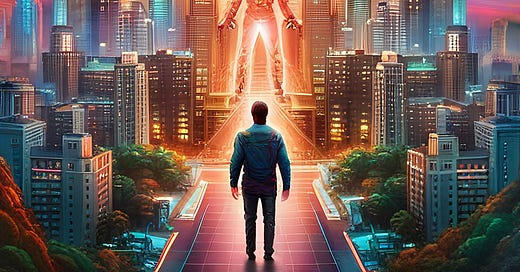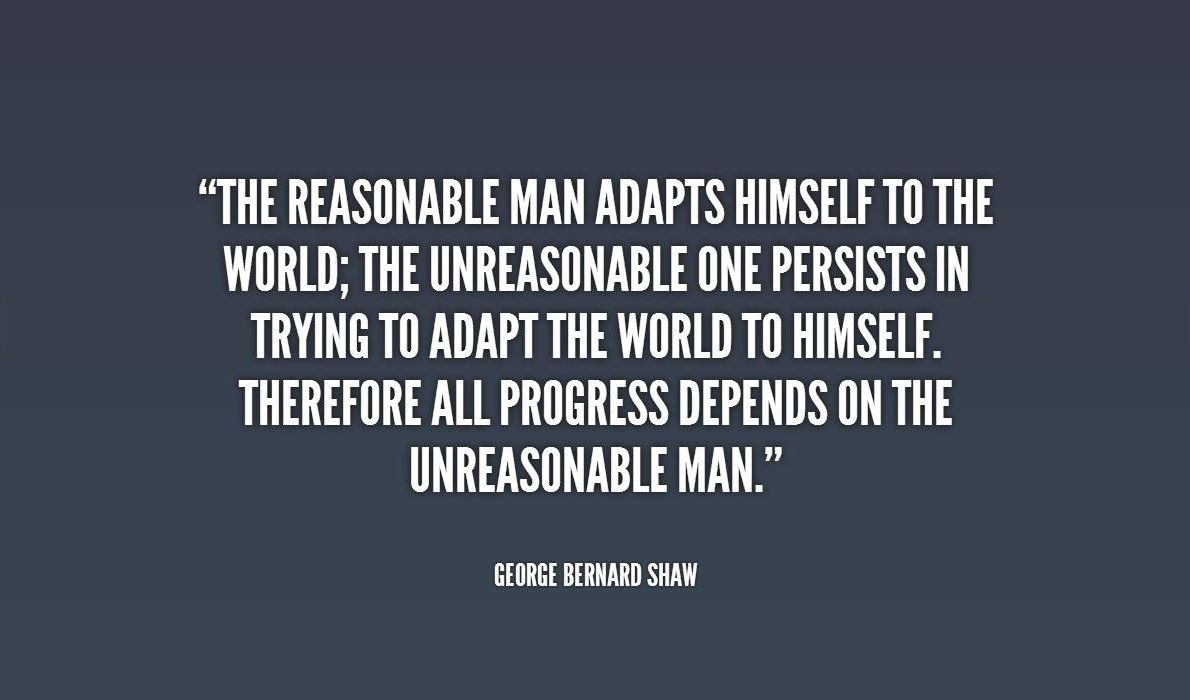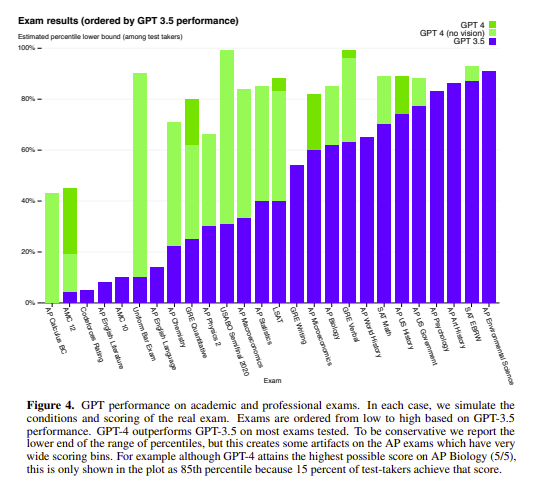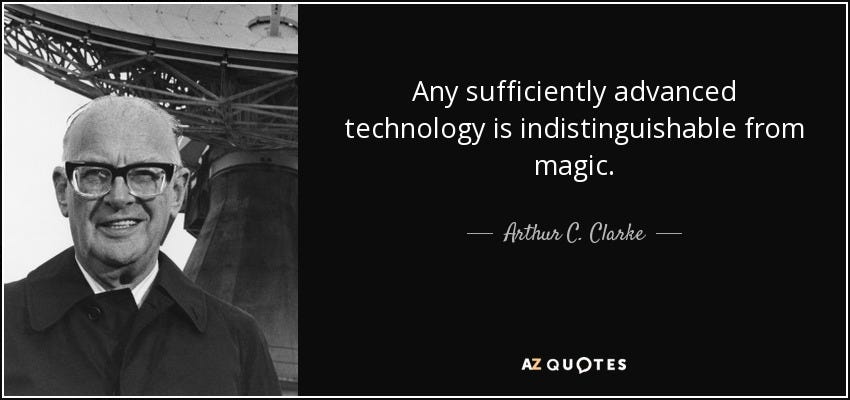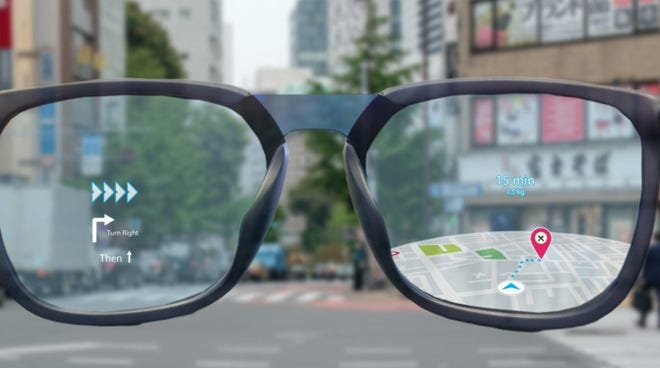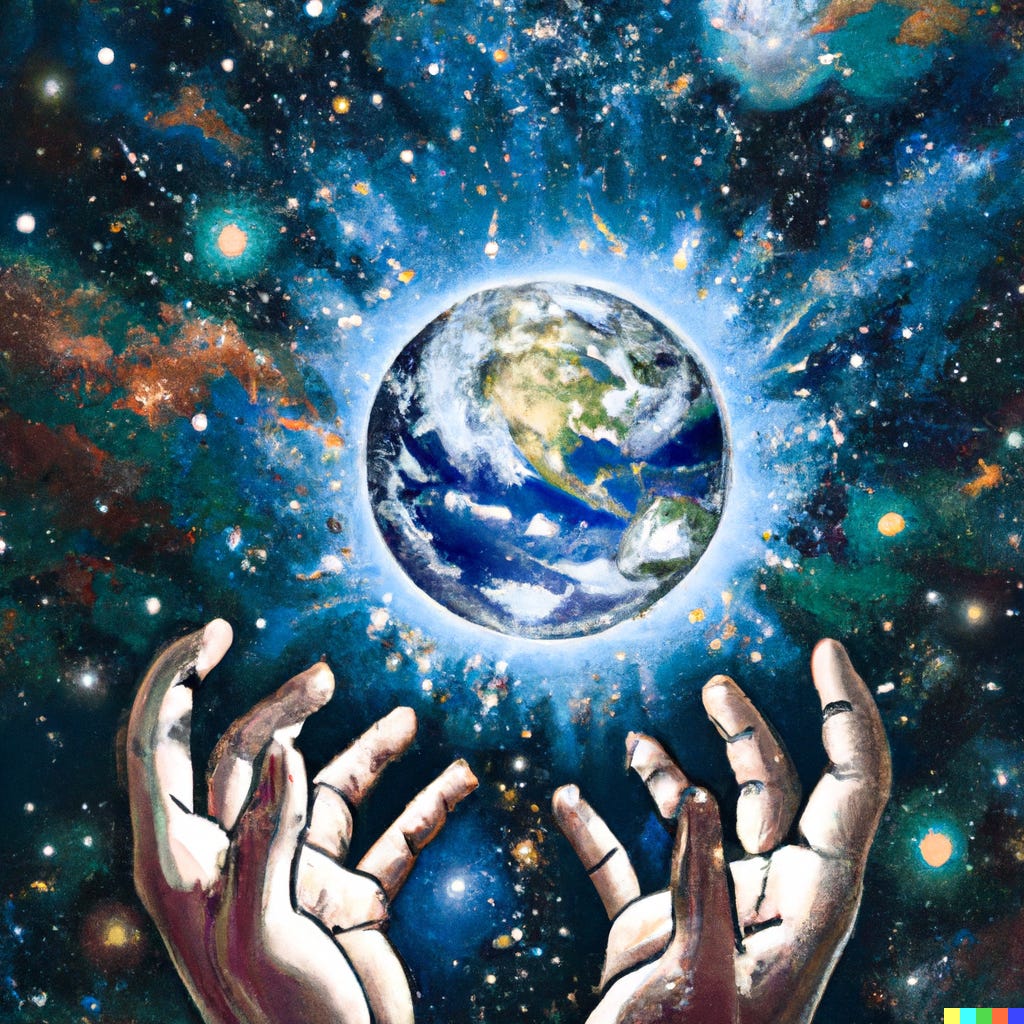Apotheosis Initializer
Throughout history, in virtually every major religion and mythology, there is a common thread. That thread, though it goes by different names and is expressed in different ways, is known as apotheosis.
It represents the raising of man from simple mortality to the realm of godhood.
While it may sound grandiose, I believe apotheosis is exactly the right way to think about our near and long-term future, and particularly the rapidly accelerating technological advances we’re seeing right now.
While there are a bunch of ways I could approach this, I think the path that makes the most sense is to describe a few of the key technologies in play, where I think those are going individually, and then to pull all the threads together to paint a picture of the path I see us following.
I’m not a seer in the oracular sense, and I’m aiming here for directional accuracy over precision, but I have the strangest, strongest sense that this will be how things play out. Bear with me :)
Artificial Intelligence
Considering the state of the current thing, it only makes sense to start here.
And I’ll be honest, despite being involved in the AI space in some capacity since 2015 (aka not long but long enough), even I did not have what we’re seeing now from OpenAI and others on my BINGO card 😂


In hindsight, it shouldn’t come as such a surprise. As I’ve written about before, all the pieces were in play and clearly visible, but they finally reached a point of intersection that enabled something truly amazing to happen.
Say it with me: ChatGPT
And while I think we’ve all been reading about and watching movies about AI in various forms for many decades, this time really IS different.
Why?
Speed.
With the largest advances we’ve seen looking back on history, the changes were relatively slow to percolate. Jobs and societies were still affected, but with lots of time to adapt.
Not this time.
And while some point to the speed of the advances in AI as dangerous, I actually think it’s the best thing that could possibly happen to us, because it serves as a forcing function.
Most of humanity is, after all, terribly complacent.
It is the nature of progress for a few to drag the many forward kicking and screaming. Much like a toddler refusing to try a new food, only to realize once they do that it’s the best thing ever nom nom nom, so too will advances in AI drag humanity forward to a new state of existence that will be amazing and beyond the wildest dreams of most.
Are there risks?
Sure, every technology is a double-edged sword, but in this case the risk is actually not the AI itself, but a stubborn humanity’s refusal to adapt.
Why *should* we adapt? What’s the upside?
A world where you never again have to do anything you don’t want to do. A world where everyone has everything they need and most of what they want, without having to lift a finger or shed a drop of sweat to have it. A world where everyone is a genius, has a personal tutor who can help them maximize their innate potential, and can pursue their authenticity in whatever way suits them best, without having to worry about making ends meet.
A world of true abundance.
Just for a moment, set aside any skepticism you may be feeling, and really think about this…how would you feel if, every day, you woke up and spent your time only on things you love? On pursuing personal creativity with no need to worry about money? Or developing new skills you find interesting, on pursuing hobbies, on time with friends and families free of work and money stress?
This isn’t a fantasy. In fact, it isn’t very far from being our lived reality.
We are realistically no more than a few years away from AI being able to do anything a human can do, better than any human can do it.
In the last year I have watched the “AI will never…” or “it’ll be decades before AI can do that, if ever…” dominoes fall again and again. And those impossible milestones are being knocked out faster and faster and faster.
It’s not going to slow down.
It’s only going to get better.
And not just the AI, but everything else because of it.
Human creativity is, as you may have heard, a remix:
Human creativity appears to rely on remixing the things that we already have in our minds. But the human mind can only hold so much, at relatively limited fidelity, usually constrained to a few areas of expertise if that, and thus can only connect so many dots.
An AI, trained on all of human knowledge, can connect all the dots. It can, potentially, solve all known unknowns, and may even be able to surface unknown unknowns.
While dark, this quote is very true in that an expert in one field often A. picks up bad habits and limiting beliefs, and B. is not exposed to sufficient cross-domain knowledge to connect the dots.
AI solves for this.
Here are just a few known unknowns (items and topic buckets) off the top of my head:
Fusion
BCI (brain computer interfaces)
WBE (whole brain emulation)
FTL (faster than light) Travel
Teleportation
Gravity
Curing Cancer
Immortality
Quantum Physics
Atomic Manufacturing
The Nature of Reality
An AI, with access to our existing knowledge, our tools, and both digital and physical “playgrounds” in which to run experiments, we’ll see advances start pouring forth so fast that it will make the enlightenment and the scientific revolution look like boring blips.
AND THIS IS A GOOD THING!
IF
If and only if we adapt our our mindset and our civilization to take full advantage of this technology to the benefit of all.
No, I’m not talking about bogus doomer Terminator-like killer AI fears. Those are absurd, as are the people who take them seriously.
I’m simply talking about making sure the upside is shared with all of humanity, and not hoarded by the modern day equivalent of greedy dragons.
We NEED to ensure abundance for all…but this will necessitate a shift in power. And prying control from the greedy and power hungry who currently run the show will in fact be the biggest hurdle we have to face.
But it CAN be done.
AI is and will continue to be an amazing tool for the benefit of humanity, but it’s only the tip of the iceberg.
Robotics
I’ve gotta say, I absolutely did not see us solving AI before we solved robotics, but here we are. That said, AI tools (and the processes developed to build and train them), can now be ported over to the world of robotics in some very cool ways.
Training a robot to do tasks in the real world, in real-time, is very hard. But what if, as with reinforcement learning for an AI, we can train a robot specific AI in a virtual environment, run it millions or billions of times with every conceivable scenario played out and weighted, and then port that trained robot AI model into a matching physical body?
🤯🤯🤯
Right now, AI lives inside our computers or phones or in a datacenter somewhere, but that is going to change, sooner than many realize.
While the biggest impact of AI right now is in the knowledge work space, embodied AI will soon be able to have just as big of an impact in the physical world. In fact, I’d wager that we see the first embodied AI, a robot with human-level intelligence, within the next 12-24 months.
And THIS changes everything.
Almost every single job that humans do today, AI and robots will be doing in the VERY near future, and probably better than humans could ever do them. Mark my words.
And frankly, THIS IS FUCKING AMAZING 😁
Why?
Tim Ferriss said it best:
No more of the “by the sweat of your brow” bullshit. We’re about to decouple surviving and thriving from work, and solve for abundance via automation in a BIG way.
At it’s core, our entire existence is really built around energy. Whether that is biology or power generation or human locomotion or even thought and computation, it’s all just energy allocation.
But much of it is inefficient in the extreme. So what happens when the combination of AI and robotics removes all the inefficiencies? Lots of things ;) But here’s one of my favorites…
The price of everything drops effectively to zero.
And THIS is why I’ve harped on crypto (dumb idea), and UBI (an even dumber idea).
Both of these concepts are still rooted in money, and money is going away folks.
Maybe we’ll still have something, energy credits perhaps, but I find even that doubtful as we’re on the cusp of solving fusion, which will lead to nearly limitless energy near-term and enable even more long-term.
We are living in the age of science fiction becoming science fact, at an insane pace.
And, again, this is only the beginning.
Augmented and Virtual Reality
Even though these technologies are lumped together, they are in fact very distinct. The key difference between the two is this: AR layers digital things over physical reality, while VR is entirely digital reality.
The impact of augmented reality I believe we’ll see first, as the merging of AI and AR will have tremendous impact on our day-to-day lives, but it is VR that will be the biggest step forward, and I want to spend the most time on why I believe that will be the case.
So, let’s look at AR briefly, and then dive deeper on VR.
Imagine if you will that your AI assistant, let’s call it Alfred, has been trained on all your personal preferences. Medical needs, dietary needs, food preferences, you name it. And this Alfred AI is running on your fancy new Apple AR glasses. They look and feel like a pair of simple glasses, but they are much, much more.
When you walk into a grocery store, as you look at a shelf, the camera on your AR glasses scans everything on the shelf and feeds the image to Alfred. Alfred, using an API, quickly pulls up the current nutritional labels for every item, compares it to your list of dietary needs and preferences, and then proceeds to highlight each item on the shelf in green (approved) and red (disapproved). Further, it checks your grocery list and it’s knowledge of what you’re running low on at home, and adds a star to each item that you might actually need.
Sound cool?
Or perhaps you’re out for a walk, and you say “I’m hungry,” so Alfred checks your preferences, and your recent outings, and suggests a new restaurant around the corner that just opened, that serves some of your favorite types of food. You think that sounds great, so Alfred books you a table. On your glasses you see an overlay on the sidewalk, glowing arrows, that lead you to the restaurant. When you arrive, the menu appears in your field of view, again with dietary acceptable foods highlighted. You order, and when it’s time to leave you just walk out, as Alfred has already settled the bill for you.
There are thousands and thousands of potential use cases like this, and I could do this all damn day.
But as cool as that is, it still suffers from one major limitation…
Reality.
And let’s be frank, reality has a lot of limitations, ranging from mortality (for now) to physics. There are many things we just can’t do, no matter how much we want to.
But that’s going to change.
While I assume you’re familiar with Ready Player One, which in my opinion is actually a really fun exploration of what VR could become, it’s not actually the best exploration of the technology.
For that, you should read books like Otherland by Tad Williams, the Bobiverse series by Dennis Taylor, and my personal favorite, Sword Art Online.
While VR today still remains super primitive, with the many advances we’re seeing in related technology, and with the help of AI to speed up those advances, I fully expect we’ll have lifelike, immersive VR this decade.
The experiential options available to us are about to explode exponentially, as a wave of creativity unlike anything the world has seen is unleashed by Human+ AI “Centaur” hybrids.
Want to fly through a nebula as a robotic eagle the size of a planet? No problemo.
Want to climb every mountain on the planet, and on every other planet in our galactic cluster? Coming right up!
Want to experience what it’s like to be a squirrel for a day, or a bird, or an octopus, or some imaginary creature from No Man’s Sky?
Want to play every level of Aincrad from SAO?
Want to walk along every inch of the sea floor? Or swim over it as a shark?
Want to spawn a new universe, seed it with life, and spend a billion years exploring it??
Imagination is about to become our only limiting factor…well, that and access to energy/compute resources ;)
With AI and robotics doing the work, and solving all our biggest existential problems, we become free to spend our potentially limitless time on exploration, allowing our curiosity and near infinite optionality to take us to places and provide us with experiences that we previously couldn’t even imagine.
And here perhaps you truly begin to see why I titled this post Apotheosis, for in a reality entirely of our making, what are we but gods?
Godhood
When I first heard about the Fermi paradox, I was fascinated. While I’d previously given a fair bit of thought to extraterrestrial life, I hadn’t given much thought to the reasons why we hadn’t unarguably encountered it.
However, as I’ve thought more about it, and many related facets of the idea such as the dark forest hypothesis, here’s what I think is the real reason we’ve not encountered intelligent life:
Almost all sufficiently advanced civilizations digitize and turn inwards, to a realm fully in their control, where they exist with no practical limits.
The Universe is MASSIVE, still rapidly expanding…and mostly empty.
And let’s face it, it’s a hostile as fuck space for a mortal, biological species.
Exploring the far reaches of the universe, if an advanced civilization were so inclined, would almost certainly be the job of probes, not people. Self-replicating probes, dropping relay stations along the way, could do the hard and dangerous and time consuming work abroad, and AI and robots do the hard work at home, while the new “gods” chill living infinite lives of imagination and exploration in their virtual environments.
Brings entirely new meaning to “God created the heavens and the earth” doesn’t it 😎
I’ve previously explored, in absurd depth, the nature of reality, so I highly recommend reading that to gain a better understanding of my thoughts in this regard.
But for here it suffices to say that the path of apotheosis is most likely a digital one, for a whole host of reasons.
As David Chalmers argued in Reality+, a digital reality is REAL, in every sense of the word. These “virtual” realities will become as real to us as this reality we experience.
Morpheus had it right when he asked Neo, “What is real? How do you define real?”
Hell, we could very well be in a virtual reality right now…
While there is so, so much more I could explore, I think this is enough for now.
If you haven’t read it yet, I recommend checking out my book The Grand Redesign, as it explores a lot of these ideas and many more, and is well suited to shaping a more positive future for humanity.
AI, Robotics, and AR/VR will be some of the biggest and most world-changing technologies of the coming decades, and have the power to transform our existence from scarcity to post-scarcity…if we can harness our collective will and make it so.
And these technologies are literally just scratching the surface of the possibility space.
So, what are you waiting for?

